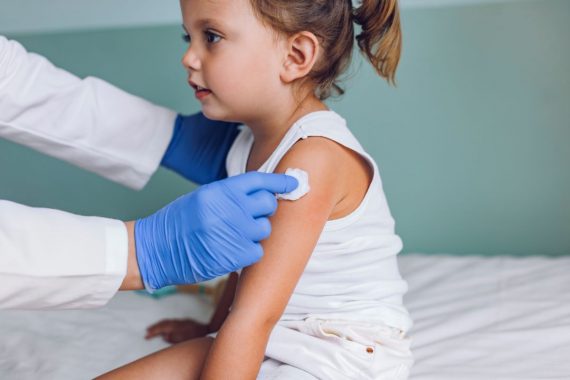Children will ‘almost certainly’ get Covid vaccine later this year, says JCVI expert

The Covid vaccine will ‘almost certainly’ be rolled out to children later in the year, a Government scientific adviser has said.
And there should be further data available on vaccine efficacy in older people ‘very soon’, the Joint Committee on Vaccination and Immunisation (JCVI) member said.
Currently, neither the Pfizer/BioNTech nor the Oxford/AstraZeneca vaccine are authorised for use in children due to a lack of data on this group.
But Professor Adam Finn, JCVI member and professor of paediatrics at the University of Bristol, today said that studies are underway to understand vaccine safety and dosing in children.
He told listeners on BBC Radio 4’s Today programme: ‘We are just starting studies right now, initially in teenagers and then in younger children with the existing vaccines.
‘We need to know that we’re giving the right dose for younger children [and] that they’re safe – that information needs to come in before we start using them.’
He added: ‘Because children don’t so often get seriously ill with Covid, they are currently not at the front of the queue in the way that they normally would be for vaccination.
‘But I think we will see vaccines being used in children later in the year, almost certainly.’
The latest NHS England guidance, updated last month, said that while the Oxford vaccine is only authorised for use in the over 18s, the Pfizer vaccine ‘may be a suitable alternative for those 16-17 years of age’.
In August, a large UK study found that children and young people are far less likely to suffer severe Covid than adults.
Meanwhile, Professor Finn also said he is ‘confident’ that Covid vaccines are effective ‘to some extent’ in those over 65 and that we will know ‘exactly’ how much ‘very soon’.
Professor Finn said: ‘The Oxford/AstraZeneca vaccine is effective in elderly people – we just don’t know yet exactly how effective but we will know that very soon.
‘And of course the exact same goes for the Pfizer and Moderna vaccines in the over 80s where we have no data at that point, but we are confident that it will be effective to some extent.’
On Friday, the Government announced an agreement with vaccine manufacturer CureVac to ‘rapidly develop new vaccines’, with an initial 50m doses of modified vaccines pre-ordered for delivery ‘later this year if they are required’.
But Professor Finn said it should be possible to tweak all of the different vaccines equally quickly to fight new mutations of the virus.
He said: ‘Just like the first time around, the differences in time actually taken to create the new version will be quite small.’
‘All of them should be able to do this pretty quickly’, he added, now that production lines are already ‘set up and functioning’.
But tweaked versions of the vaccines are ‘very unlikely’ to be ready by mid-April so second doses for those who have already received their first will use ‘the exact same vaccines as we’ve got now’, he added.
He said: ‘Aside from the time taken to bring new versions through, we actually do need to think very carefully about what exactly variant or variants to put into the new versions of the vaccines.
‘The variants you’re hearing about now may very well not be the ones that will be relevant later in the year, so it’s critical that we do a bit of head-scratching and investigation first before we end up chasing our own tails and producing the wrong vaccine.’
The vaccines minister has said that GPs could be administering Covid variant ‘booster shots’ later this year – perhaps in the autumn.
Pulse October survey
Take our July 2025 survey to potentially win £1.000 worth of tokens

Visit Pulse Reference for details on 140 symptoms, including easily searchable symptoms and categories, offering you a free platform to check symptoms and receive potential diagnoses during consultations.












